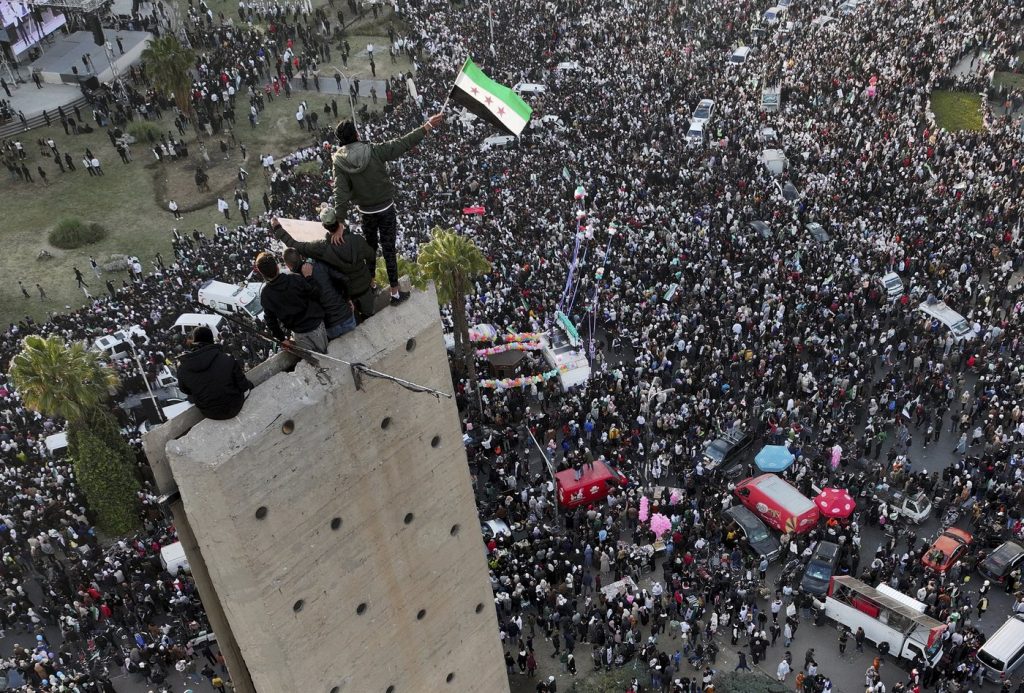US drops $10M terrorism bounty offered for capture of Syrian rebel leader who ousted Assad

DAMASCUS, Syria (AP) — The Biden administration said Friday it has decided not to pursue a $10 million reward it had offered for the capture of a Syrian rebel leader whose forces led the ouster of President Bashar Assad earlier this month.
The announcement followed a meeting in Damascus between the leader of Hayat Tahrir al-Sham, or HTS, Ahmad al-Sharaa, who was once aligned with al-Qaida, and the top U.S. diplomat for the Middle East, Barbara Leaf, who led the first U.S. diplomatic delegation into Syria since Assad’s ouster.
HTS remains designated a foreign terrorist organization, and Leaf would not say if sanctions stemming from that designation would be eased. But, she told reporters that al-Sharaa had committed to renouncing terrorism and as a result the U.S. would no longer offer the reward.
Advertisement
“We discussed the critical need to ensure terrorist groups cannot pose a threat inside Syria or externally, including to the U.S. and our partners in the region,” she said.
“Based on our discussion, I told him that we would not be pursuing the Rewards for Justice reward offered,” Leaf said in a telephone news conference from Jordan where she traveled after visiting Syria.
Leaf and other U.S. officials have said al-Sharaa’s public statements about protecting minority and women’s rights are welcomed, but they remain skeptical that he will follow through on them in the long run.
“He came across as pragmatic,” she said. “It was a good first meeting. We will judge by deeds not just by words.”
The US. delegation’s visit was aimed at pushing for an inclusive government and seeking information on the whereabouts of missing American journalist Austin Tice.
Advertisement
Along with Leaf, former special envoy for Syria Daniel Rubinstein and the Biden administration’s chief envoy for hostage negotiations, Roger Carstens, joined the meetings with interim leaders and members of civil society.
Carstens said there was no new information confirming Tice’s fate or whereabouts but vowed that efforts to find him would continue. He traveled previously to Lebanon to seek information. More U.S. officials are expected to visit Syria in the coming days to pick up the search, he said.
“We’re going to be like bulldogs on this,” Carstens said, adding that the U.S. was focusing on about six prisons where it believed Tice may have been held in the past. He said the U.S. also had information about three more prisons where Tice might have been incarcerated, and up to 40 sites may end up being examined for evidence of Tice’s presence.
Tice, who has had his work published by The Washington Post, McClatchy newspapers and others, disappeared at a checkpoint in a contested area west of Damascus as the Syrian civil war intensified.
A video released weeks after Tice went missing showed him blindfolded and held by armed men and saying, “Oh, Jesus.” He has not been heard from since. Assad’s government publicly denied that it was holding him.
Advertisement
Leaf’s team was the first group of American diplomats to formally visit Syria in more than a decade, since the U.S. shuttered its embassy in Damascus in 2012, although a small number of U.S. diplomats had been assigned to political advisory roles with military units inside Syria since then.
Shortly before the delegation arrived in Damascus, the U.S. military said it had conducted airstrikes in northeastern Syria on Thursday, killing a leader of the Islamic State group and one other militant. The strike was part of an ongoing effort to prevent IS insurgents from taking advantage of the upheaval in Syria, including any plan to release the more than 8,000 IS prisoners held in detention by Kurds who have partnered with the U.S., Central Command said in a statement.
The Pentagon revealed Thursday that the U.S. had doubled the number of its forces in Syria to fight IS before Assad’s fall. There are roughly 2,000 there now.
The diplomats’ visit to Damascus will not result in the immediate reopening of the U.S. embassy, which is under the protection of the Czech government, according to U.S. officials, who said decisions on diplomatic recognition will be made when the new Syrian authorities make their intentions clear.
___
Advertisement
Lee reported from Washington.
Abby Sewell And Matthew Lee, The Associated Press